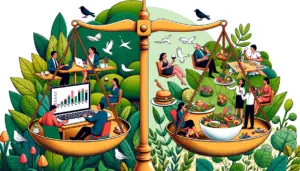With each challenge in our life, we are presented with an opportunity to grow as a person
Summary:
- Personal development – a.k.a. self-improvement – completely changed my life for the better
- Yet, just doing personal development for its own sake isn’t good either
- We cannot infinitely improve every area of life; our resources – time and energy – are limited
Practical advice:
- We need to prioritize our energy and time
- Be careful adopting new dreams and goals that could harm the success and happiness you’ve already built
- Ideally, what we do serves a higher purpose
Dear friend,
Most people who personally know me think I am an uncommon person (a mixture of strange, quirky, and extraordinary I’d say). One reason for that is my aspiration to never be satisfied. About 5 years ago, I decided for myself that I’ll never be satisfied – whether with my grades, my body, my social skills, my sleep, my hobbies, or my relationships with friends and family.
I aspire to this infinite improvement because it makes me a happy person. For sure, I could be happy without this aspiration, but my curiosity strives for more. The past years have shown me that life has so much to offer, and by making today at least a little bit better than yesterday, I nurture my curiosity and hunger for life’s opportunities.
But this aspiration comes at an expense: We cannot improve everything anytime. We have to budget our energy and time. And raising our standards to a certain level will make that the new default, i.e. if we achieve very good grades, we get used to them, feel miserable when we get “just” a good grade, and don’t feel happy as we used to. Self-improvement for its own sake clearly has its limits.
In today’s blog article, I will elaborate on why I still aspire to be never satisfied, why not everything should be improved, and what I do to overcome this conflict.
Aspire to be never satisfied
Personal development – a.k.a. self-improvement – completely changed my life for the better. The little shy kid from the countryside who was inhibited by his inner beliefs and anxieties became a highly self-confident, positively-minded, cosmopolitan adult who aspires to make our world an even better place.
The good thing about life is that once we really want something and commit to it, we will most likely obtain it. In terms of personal development, that could be to (1) become more fit and healthy (2) find our purpose in life (3) acquire or enhance our personal skills (4) improve our personal relationships.
Until this point, everyone would agree that personal development is basically a good thing. Yet, my aspiration to be never satisfied – i.e. never stop this personal development journey – creates controversy: “How can you ever be happy if you’re never satisfied?”, “That cannot be fun!”, “Sounds quite miserable, doesn’t it?”
Well, I need to admit I wouldn’t recommend this way of living to everyone. I made certain experiences that taught me crucial lessons leading to this highly personal commitment.
Happiness isn’t about satisfaction, it’s about gratefulness, great relationships, and many other factors. Just because I’m not satisfied with something doesn’t mean I’m not grateful for it. Rather the opposite is true, I greatly appreciate every aspect of life.
I don’t compare myself to others since that really makes us feel miserable. My aspiration to become better and better comes from comparing to my “fictitious best self”. I ask myself what I can do better, what are things I can marginally improve, and how can I ensure to give 100% the next time?
I learned that solving problems, particularly those we chose ourselves, makes us happy. And, as you might have already experienced by yourself, life is all about solving problems. You will never reach a state where there’re no problems to solve.
For me, it feels greatly satisfying to “improve” the various aspects of life: Whether it’s the relationships with my friends, family, and colleagues, my self-confidence, my social skills, my health and fitness, my financials, etc. Hence, those are “problems” I love solving.
Not everything should be improved
Contrarily, just doing personal development for its own sake isn’t good either.
First, hedonic adaptation – the tendency of humans to quickly return to a relatively stable level of happiness despite major recent positive or negative events – makes us want more and more. No matter what I improve and how much happiness this improvement yields, it’s just of a temporary nature. For instance, the first time I ran at a 4:30 pace was an incredibly satisfying achievement. Today, though, I’d be rather disappointed if aimed for my maximum performance and ran this pace.
Second, we experience diminishing returns in almost any area of life. Whether it’s the number of delicious sweets we eat, the number of trips home to visit our family in a year, the number of gifts at Christmas we receive – those are all experiences that start out highly valuable at first but then diminish in value the more frequently we do them.
Third, life is all about economics. We cannot infinitely improve every area of life; our resources – time and energy – are limited. For example, if we spent all our energy to improve our career, there might not much be left to enjoy the company of our friends and family. Hence, we have to carefully prioritize and choose the things we want to spend most of our time and energy on.
Overcome the improvement dilemma
In the past few years during this personal development journey, I’ve learned a few crucial things. Improvement is a good thing and, actually, it’s not the problem; rather, it’s the why motivating the improvement that matters. Therefore:
First, we need to prioritize our energy and time. I regularly reflect on what are the largest areas of improvement in my life and which of those have the best impact on it. For example, I focus on projects in my job as a consultant that might not be the fanciest ones but comply most with my “personal operating model”; I limit my alcohol consumption to 6 events per year as I prioritize my health over pleasure; I quit my TikTok channel to have more time for my friends and family at the weekend.
Second, don’t “self-improve” for its own sake. As previously written, hedonic adaptation will make us want more and more of something to get a similar happiness boost as we got the first time. For instance, aiming for very good grades just to have them is suboptimal; aiming for more and more money is suboptimal; optimizing our diet more and more just to improve it is suboptimal.
We need to be careful adopting new dreams and goals that could harm the success and happiness we’ve already built. Ideally, what we do serves a higher purpose. Personally, I want to improve myself to increase my leverage to make our world a better place, help my friends and family, and improve the lives of other people.

Goal Achievement
I categorize decisions into three types: shirts, hiring, and tattoos.
The bulk of decisions are like shirts. You try one and if you don’t like it, swap it. The stakes are low, so optimize for

